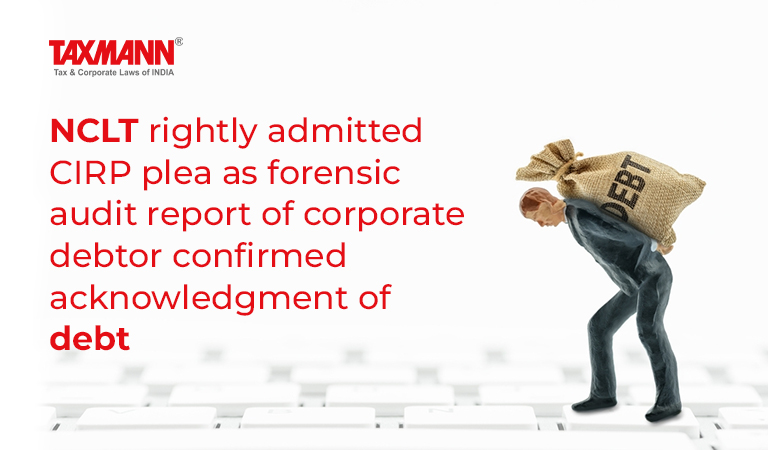NCLT rightly admitted CIRP plea as forensic audit report of corporate debtor confirmed acknowledgment of debt
- Blog|News|Insolvency and Bankruptcy Code|
- 2 Min Read
- By Taxmann
- |
- Last Updated on 24 May, 2022

Case Details: Avneesh Kumar Singh v. Indian Delco (P.) Ltd. - [2022] 138 taxmann.com 211 (NCLAT- New Delhi)
Judiciary and Counsel Details
-
- Anant Bijay Singh, Judicial Member & Ms Shreesha Merla, Technical Member
- Anish Guptafor the Applicant.
- Pallav for the Respondent.
Facts of the Case
In the instant case, the financial creditor had extended a loan facility to the corporate debtor in the year 2013 at 12% interest per annum for a period of six years under a loan agreement. The Corporate debtor had made some payments to the respondent towards the principal amount along with an interest and thereafter stopped making payments.
In the year 2019, the corporate debtor issued confirmation of the outstanding balance to the respondent. Since the loan was given for a period of six years from the date of the agreement, and the said period had already expired, the respondent issued a demand notice to the corporate debtor.
Despite several reminders as well as a legal notice, the corporate debtor failed to clear the outstanding payments of the respondent. Therefore, the respondent filed an application under section 7 of the IBC, 2016 against the corporate debtor.
The respondent submitted that the corporate debtor had issued confirmation acknowledging the debt of the respondent. Further, in the Forensic Audit Report of the corporate debtor its auditor had admitted this fact that funds were received from the respondent and were properly utilized by the corporate debtor.
The Adjudicating Authority(AA) considered the above submissions made by the respondent and admitted the CIRP application filed by the respondent.
The Corporate Debtor filed an appeal before the Hon’ble National Company Law Appellate Tribunal against the order of the Hon’ble NCLT.
The appellant submitted that the AA has to ascertain the existence of a default from the records of the Information Utility or on the basis of other evidence furnished by the Financial Creditor. In the present case, there is neither any record of default recorded with Information Utility nor evidence of any other default furnished by the Financial Creditor. The appellant further raised questions on the validity of the loan agreement.
NCLAT Held
The NCLAT held that the Appellant has duly acknowledged the debt of the Respondent by countersigning the audited balance sheet of the financial year 2015-16 of the Corporate Debtor. Further the Forensic Audit Report, the Auditor has admitted this fact that the funds were received and it was also admitted that amount was properly utilized in the Company. Therefore, NCLAT upheld the decision of the NCLT and dismissed the plea of the appellant. NCLAT held that there was no illegality committed by Adjudicating Authority while passing impugned order.
List of Cases Reviewed
-
- Indian Delco (P.) Ltd. v. SN Jee Build Well (P.) Ltd. [2022] 138 taxmann.com 210 (NCLT – New Delhi) (para 21) affirmed [See Annex]
Disclaimer: The content/information published on the website is only for general information of the user and shall not be construed as legal advice. While the Taxmann has exercised reasonable efforts to ensure the veracity of information/content published, Taxmann shall be under no liability in any manner whatsoever for incorrect information, if any.

Taxmann Publications has a dedicated in-house Research & Editorial Team. This team consists of a team of Chartered Accountants, Company Secretaries, and Lawyers. This team works under the guidance and supervision of editor-in-chief Mr Rakesh Bhargava.
The Research and Editorial Team is responsible for developing reliable and accurate content for the readers. The team follows the six-sigma approach to achieve the benchmark of zero error in its publications and research platforms. The team ensures that the following publication guidelines are thoroughly followed while developing the content:
- The statutory material is obtained only from the authorized and reliable sources
- All the latest developments in the judicial and legislative fields are covered
- Prepare the analytical write-ups on current, controversial, and important issues to help the readers to understand the concept and its implications
- Every content published by Taxmann is complete, accurate and lucid
- All evidence-based statements are supported with proper reference to Section, Circular No., Notification No. or citations
- The golden rules of grammar, style and consistency are thoroughly followed
- Font and size that’s easy to read and remain consistent across all imprint and digital publications are applied



 CA | CS | CMA
CA | CS | CMA
